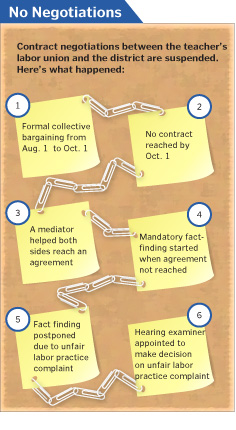Due to the Carmel Clay Education Association’s (CCEA) recent filing of an unfair labor practice (ULP) complaint, contract negotiations between the association and the Carmel School Board have been suspended. According to CCEA president Brian Lyday, a hearing examiner appointed by Indiana Education Employment Relations Board (IEERB) will decide whether or not there was a violation of Indiana labor law in a hearing that is scheduled to take place from March 19 to 21. Lyday said the attorneys postponed the hearing, previously scheduled for January, after considering the time requirements for each step in the process.

STATEIMPACT.COM / SOURCE
The CCEA claims Superintendent Jeff Swensson and Andrew Klein, 2008 to 2012 school board vice president, unfittingly communicated with teachers about contract negotiations. Although the hearing examiner will make the final call, Klein said these allegations are false.
“I do deny that I had any inappropriate communications with teachers in the school district,” Klein said.
Swensson declined to comment.
According to Klein, the ULP filing halted the fact-finding process, in which both the association and board submit their “last best offer” to an IEERB-appointed fact-finder. The fact-finder would then choose one side’s offer and finalize the contract during a hearing.
“If the hearing examiner decides that there was no violation of Indiana labor law, then the negotiation process would continue at the point where it was delayed,” Klein said. “Right now, everything is in limbo until the examiner’s decision.”
After mediation failed, both the association and the board presented their “last best offers.” However, the “last best offer” is not necessarily the most beneficial offer for both sides, as it is funded by state sources of revenue as opposed to any source of revenue.
According to a Nov. 26, 2012 public status report, delivered by Klein on behalf of the board, a teacher’s compensation could potentially rise 10 percent if a teacher takes advantage of all the proposals in what he claims is the school board’s actual best offer. These proposals include items such as a base pay increase and a performance bonus.
On the other hand, Lyday said one of the reasons why the association rejected the board’s offer was because it would not financially benefit teachers after taking into consideration the increased workday, which would be lengthened by a half hour.
“For the extra half hour, the administration’s unwilling to provide any additional compensation,” Lyday said. “So when you take the amount of money that they have offered as an increase in salary and you adjust it for the additional time, it actually ends up being a decrease in what the teacher is paid.”
The association also refused the board’s offer because it included, according to Lyday, an excess of professional development and a removal of the 5 percent increase in pay, previously given to teachers responsible for more than one class.
“In essence, it takes away time that the teachers use to grade, comment, prepare for class (and) get materials together. (It) cuts that time in half and at the same time then gives (teachers) another class to instruct without any compensation for the exchange,” Lyday said.
According to Klein, one of the major disagreements between the association and the board was what could be included in the contract in light of 2011 changes to Indiana’s collective bargaining law.
“(The amended law) introduced complications that obviously did not exist prior to the new law, and going through things for the first time is challenging,” Klein said.
However, contract negotiations are on hold until the ULP is resolved, according to Klein. Another round of bargaining will begin in August between the association and the school board.

































![AI in films like "The Brutalist" is convenient, but shouldn’t take priority [opinion]](https://hilite.org/wp-content/uploads/2025/02/catherine-cover-1200x471.jpg)









































![Review: “The Immortal Soul Salvage Yard:” A criminally underrated poetry collection [MUSE]](https://hilite.org/wp-content/uploads/2025/03/71cju6TvqmL._AC_UF10001000_QL80_.jpg)
![Review: "Dog Man" is Unapologetically Chaotic [MUSE]](https://hilite.org/wp-content/uploads/2025/03/dogman-1200x700.jpg)
![Review: "Ne Zha 2": The WeChat family reunion I didn’t know I needed [MUSE]](https://hilite.org/wp-content/uploads/2025/03/unnamed-4.png)
![Review in Print: Maripaz Villar brings a delightfully unique style to the world of WEBTOON [MUSE]](https://hilite.org/wp-content/uploads/2023/12/maripazcover-1200x960.jpg)
![Review: “The Sword of Kaigen” is a masterpiece [MUSE]](https://hilite.org/wp-content/uploads/2023/11/Screenshot-2023-11-26-201051.png)
![Review: Gateron Oil Kings, great linear switches, okay price [MUSE]](https://hilite.org/wp-content/uploads/2023/11/Screenshot-2023-11-26-200553.png)
![Review: “A Haunting in Venice” is a significant improvement from other Agatha Christie adaptations [MUSE]](https://hilite.org/wp-content/uploads/2023/11/e7ee2938a6d422669771bce6d8088521.jpg)
![Review: A Thanksgiving story from elementary school, still just as interesting [MUSE]](https://hilite.org/wp-content/uploads/2023/11/Screenshot-2023-11-26-195514-987x1200.png)
![Review: "When I Fly Towards You", cute, uplifting youth drama [MUSE]](https://hilite.org/wp-content/uploads/2023/09/When-I-Fly-Towards-You-Chinese-drama.png)
![Postcards from Muse: Hawaii Travel Diary [MUSE]](https://hilite.org/wp-content/uploads/2023/09/My-project-1-1200x1200.jpg)
![Review: "Ladybug & Cat Noir: The Movie," departure from original show [MUSE]](https://hilite.org/wp-content/uploads/2023/09/Ladybug__Cat_Noir_-_The_Movie_poster.jpg)
![Review in Print: "Hidden Love" is the cute, uplifting drama everyone needs [MUSE]](https://hilite.org/wp-content/uploads/2023/09/hiddenlovecover-e1693597208225-1030x1200.png)
![Review in Print: "Heartstopper" is the heartwarming queer romance we all need [MUSE]](https://hilite.org/wp-content/uploads/2023/08/museheartstoppercover-1200x654.png)




